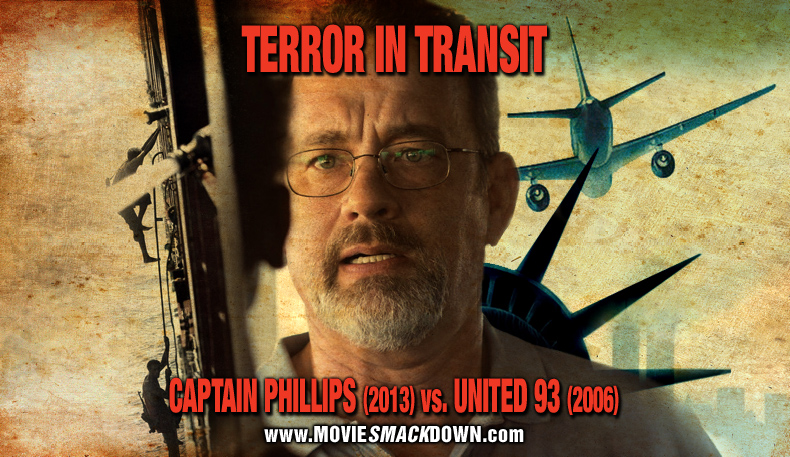
 The Smackdown
The Smackdown
What does Paul Greengrass have against public transportation anyway? In both United 93 and his new film, Captain Phillips, Greengrass puts the fear of God into anyone about to take a flight or sail on a cargo ship. And that’s not to mention the vehicles that come under assault in his Jason Bourne movies.
Greengrass got his start in horror and then documentaries, and those early skills are in ample evidence here. In the celluloid world of Paul Greengrass, clench your fists and swallow hard, because good guy or bad, the characters are very human, and you’re about to go through hell with them. As they make preparations for the day ahead, maybe planning a trip, going to work or saying a prayer, the scenes build on one another, and the ordinary grows more and more ominous.
We know what comes next in both these fact-based films about terror in transit. There is hardly anyone on the planet who doesn’t know the fate of United 93, and most have heard about the events depicted in Captain Phillips. But the director’s genius keeps us riveted anyway, breathless to see these ordinary people make quick decisions and try to turn bad circumstances to good account. So buckle your seatbelts; you’re about to get jacked up by a master.
The Challenger
Two-time Oscar-winner Tom Hanks plays Captain Phillips as a regular guy just trying to get his job done. Of course, his job entails piloting a merchant ship through the treacherous Indian Ocean, aswarm with pirates near Somalia, but we are getting ahead of ourselves. His wife drives him to the airport, as is their routine, and kisses him goodbye. When Phillips arrives at the ship in Oman, he checks it, instructs his crew and then settles down to read his email, which warns him that pirates have been attacking ships in the area. He decides it is prudent to run some drills to be prepared for the worst, which inevitably follows.
At the same time, we see the pirates planning their moves. Portrayed as victims of circumstance, just trying to survive as they answer to the warlords who control them, the Somalis are determined not to be thwarted by the usual tactics shipping crews use to fend them off. Since it is illegal for merchant ships to have weapons in international ports, crews often use fire hoses to keep the tiny pirate skiffs at bay. But that does not work out that well for this particular crew.
The ordinary men of the Maersk Alabama pull together to derail the hijackers who have boarded their ship, demanding goods and money. As the captain attempts to negotiate, he is taken hostage in the escape lifeboat he offers to the Somalis. Pirates and hostage set out to sea but are soon pursued by destroyer USS Bainbridge, with Navy SEALs to follow. At this point, the film veers from personal drama to full-blown-Bourne, and Greengrass showcases his action chops… which is not good news for the pirates.
The Defending Champion
We know that four airplanes were hijacked on 9/11. Three were used as weapons of mass destruction. The last, because of delays on the ground, gave passengers a unique awareness of the ill intent of the hijackers, along with a chance to abort the mission. Sounds like a perfect scenario for a Movie of the Week — and in fact, it was. But United 93 is not that movie; the exquisite, restrained suspense and the visceral connection we have to its subject matter elevate it far beyond that. As the action alternates between the aircraft, the National Air Traffic Control Center, various local towers and military command, the tension amps up to an almost unbearable level.
We now know all the names and the back stories, but in United 93, Greengrass does not give us information about the characters beyond the phone calls they make. The film begins with Muslim men reciting the Koran, passengers driving to the airport, waiting in line, waiting at the terminal. Air traffic controllers are on the job, as are the military at NORAD. Greengrass makes no distinction here between the heroes and villains, other than showing the men-who-would-be-hijackers sweating profusely.
There are no well-known actors in this film. Some of the players are actual airline employees and air traffic controllers, but all are ably directed to reflect the unspeakable horror as the events of the day play out in real time. We see the ineptitude of some who should be responsible for mitigating this disaster, and we see the band of soldiers formed within the cabin, in an attempt to control their fate.
The Scorecard
Greengrass is a master of the taut thriller. Both films keep audiences on tenterhooks from beginning to climactic end. This is no easy task when much of each film centers on the routine workaday world and has an outcome we already know. There is an awful lot of time spent staring at dots on radar screens, reading digital messages and barking out orders. At first, all appears to be routine, but as the tension deepens, so do the furrows in the characters’ brows. Then in each film we hear, “This is real-world. This is not a drill.†It is too late to cover our eyes. The horror is upon us.
The villains in each film are shown to be human, following orders they think will improve their chances in life — or in death. Some are young and impressionable. Some panic, some stay resolute. Greengrass does his best to show their humanity, but let’s face it: It’s nearly impossible to feel compassion for the terrorists in United 93 who were hell-bent on our destruction. Captain Phillips‘ hijackers are the more sympathetic villains.
Well known for his shaky cam style of cinematography, Greengrass uses quick hand-held shots in both films, but to better effect in United 93. The jolting camera works well to show the passengers’ confusion turning to fear, as well as their physical discomfort as the plane loses altitude and jerks about. In Captain Phillips, I actually noticed I was feeling seasick, and that was before the ship left the harbor.
The advantage gained by the camera in United 93 is lost in its overly dramatic music. The soundtrack can add to the tension of a thriller, or it can annoy the audience. From the opening seconds of United 93 until the end, we are reminded by the music that something bad is about to happen — as if we didn’t already know. I didn’t even notice the music in Captain Phillips, and that’s a good thing.
The films diverge in the portrayal of United States government agencies. I prefer the capable government of the Captain Phillips era to the bumbling federal employees depicted in United 93. As soon as the captain is taken off the Maersk, the president, the FBI and the Navy spring into action. They are the heroes of this film. It is all business: negotiate, surrender or be taken down with steely precision by the SEALs. There was no panicking, no mucking around. Boom, boom, boom. On the other hand, in United 93, the executive branch, the FAA and NORAD could not seem to drum up any decision-makers. Only the air control supervisor seemed to have his head on straight. This may be an honest representation of real-life events, but as drama, it’s not so satisfying to watch.
The Decision
It’s tough to choose a favorite Greengrass film. United 93 is filled with emotion, because it is still a raw memory for us, and it’s treated with bracing restraint, doing the event justice without being melodramatic. The little-known actors do a terrific job, but they simply can’t compete with Tom Hanks, who brings his role — and the whole film — up to Oscar level. Thanks to Hanks and the dazzling Navy SEALs, I give this one to Captain Phillips.

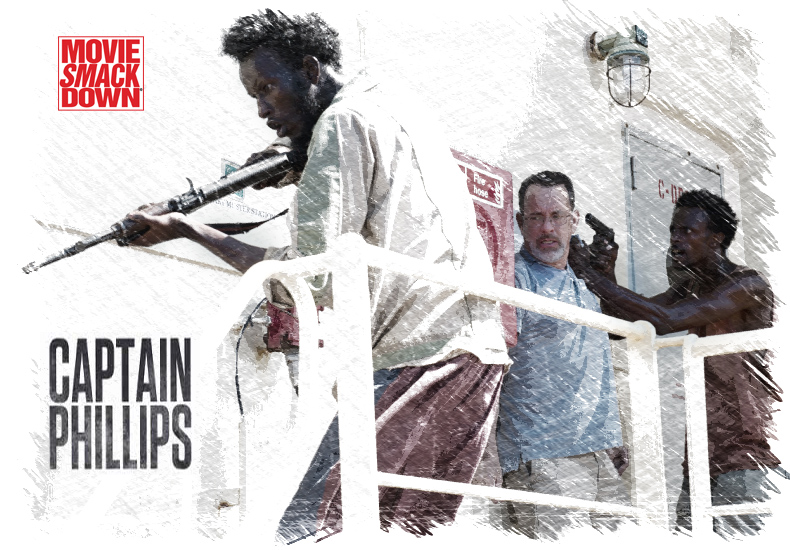
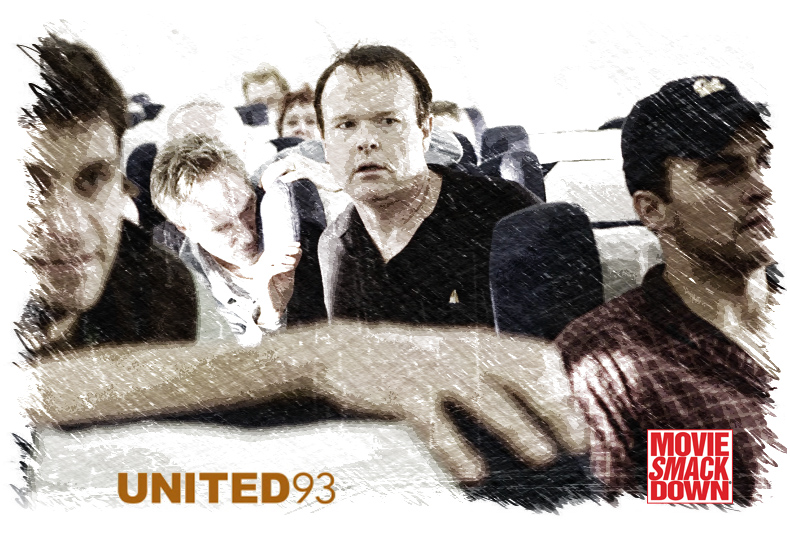


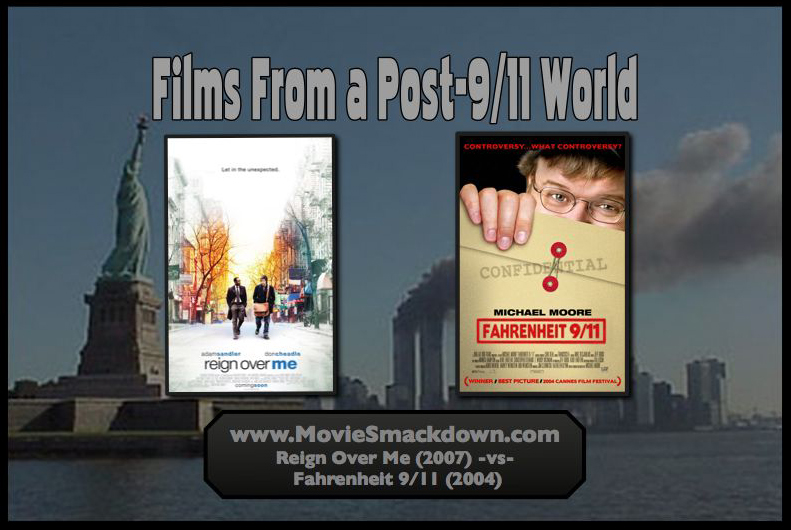
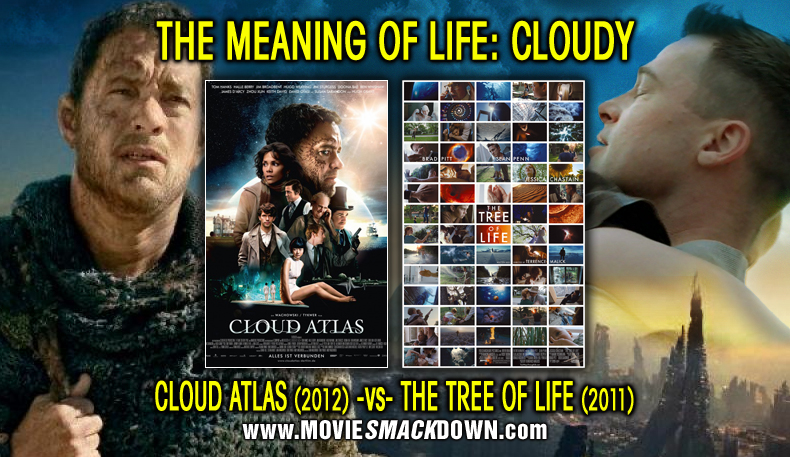
Thank you, both.
Oops —
I meant to say “A very well-written review.”
Lynda:
I very well-written review. Keep up the good work!
This is a really exciting Smackdown — and the writing in this particular piece is as good as it gets, thanks to Ms. Karr’s great gifts for language, reporting, criticism and building suspense of her own choosing. Her final choice is the one that I would have picked, too….and her reasoning is solid, strong, smart and strategic. But, as with the movies involved, the ride itself of reading along with Ms. Karr’s writing makes the trip ever more enjoyable. More of this, please, sirs.